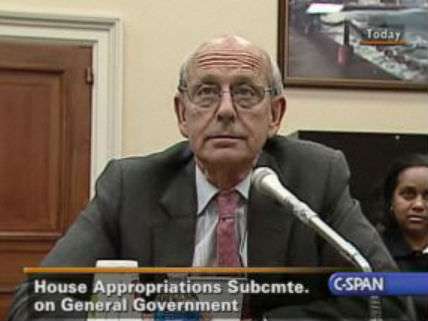Stephen Breyer, the Supreme Court's 'Raging Pragmatist'

This week marks the 20th anniversary of Justice Stephen Breyer's appointment to the U.S. Supreme Court. Writing at USA Today, Richard Wolf marks the occasion by pronouncing Breyer the "high court's raging pragmatist," a jurist who, "perhaps more than anyone in Washington…is a believer in the democratic system." That democratic impulse, Wolf explains, has led Breyer to favor judicial "deference to police, states and voters," and also to Congress. "On the current court," Wolf observes, Breyer "has been the justice least inclined to strike down legislative actions."
In other words, on issues ranging from aggressive police tactics to the broad exercise of congressional power, Breyer has been a pretty reliable vote for the government. In fact, Breyer has even gone so far as to apply his deferential approach retroactively, using it as a lens through which to view the Supreme Court's past rulings on the scope of government power. For example, here's how Breyer tackled the Supreme Court's 1944 ruling in Korematsu v. United States, as recounted in my review of Breyer's 2010 book Making Our Democracy Work:
In Breyer's view, the Supreme Court must "take account of the role of other governmental institutions and the relationships among them" and work to "maintain a workable relationship" between the various branches of government. That may sound innocuous, but consider the implications. In 1944 the Supreme Court heard the case of Korematsu v. United States, which dealt with President Franklin Roosevelt's wartime internment of some 70,000 Japanese-Americans. Surely this case qualifies as a situation where the Supreme Court should have scrapped the "workable relationship" and struck down FDR's offensive and unconstitutional actions?
Not necessarily, Breyer writes. "Perhaps [the Court] could have developed a sliding scale in respect to the length of detention" or "insisted the government increase screening efforts the longer an individual is held in detention" or found some other way to maintain a "workable relationship with the president." A genuine "Scalia of the left" would have had no problem repudiating the Court's craven decision. Even Elena Kagan, who expressed very few actual opinions during her recent Supreme Court confirmation hearings, managed to denounce Korematsu. The Court needs a stronger liberal voice than Breyer's in contentious cases like this.


Show Comments (38)